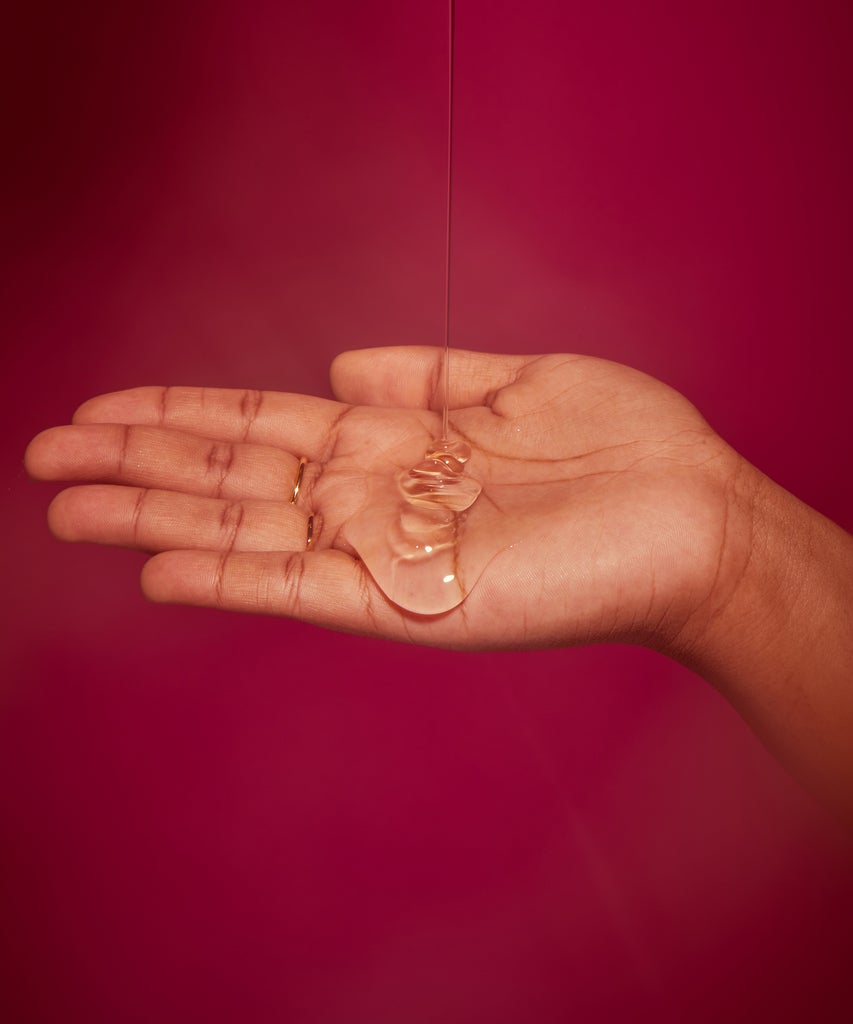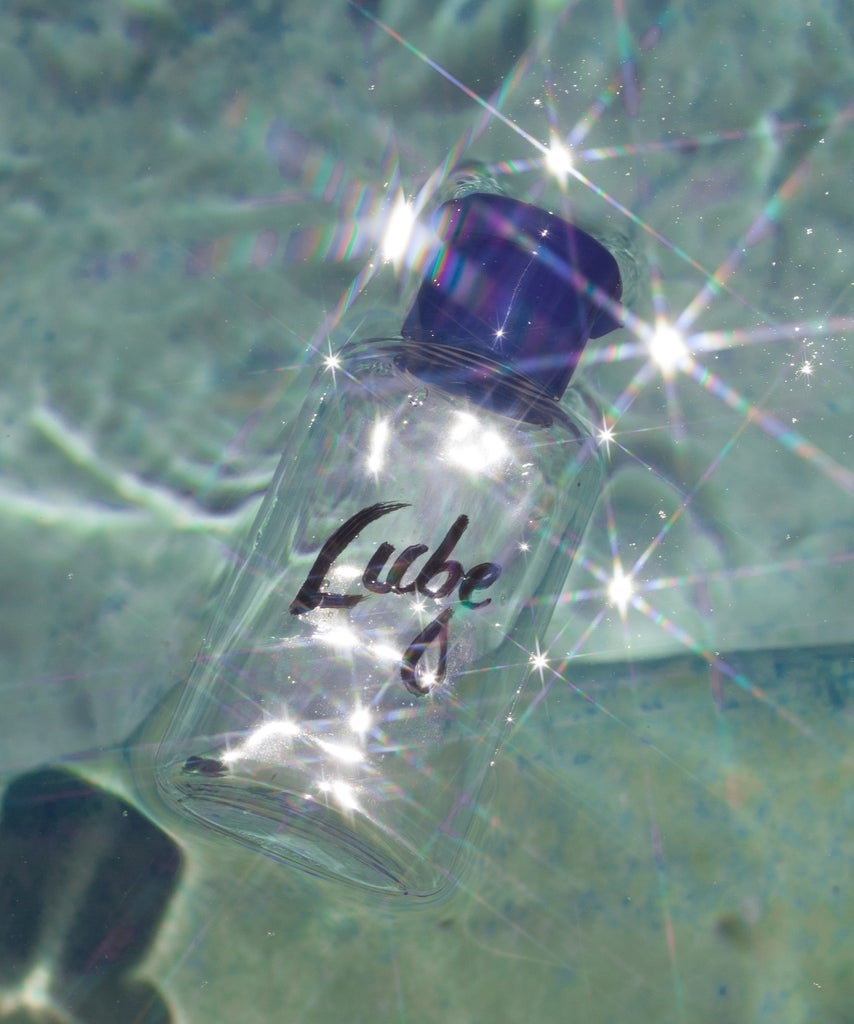
I’m not afraid to admit that the selection of lubes in my bedside table is nearly as robust as the selection of makeup products in my medicine cabinet. Look, I’m a health reporter; I need them for research, okay!? And my commitment to quality testing made me particularly interested when TikTok introduced me to an entirely new way to use sexual lubricant: as a makeup primer.
The #lubeprimer hashtag on TikTok currently has more than 10.6 million views, and the reviews are mixed. Some claimed that using lubricant in place of regular primer made their faces look as dewy as a blade of grass after a fresh-fallen rain. Others said the effects weren’t worth the bad breakout that followed. I’d never considered putting lube on my face before, but I was intrigued and, frankly, hyped to try it myself.
So, on a Thursday night, I washed my face, then slathered on a healthy dollop of an organic, aloe-based lube I had on hand. After giving it a minute to dry down, I applied my foundation and highlighter as usual. When I was done, I stared at myself in the mirror and nearly gasped aloud. My skin glowed like it never had before. I wondered if this was what fireflies felt like when they lit up. A once-weird-looking bug mystically and briefly transforming into a shiny, fun bug — that was me!
A glow like this couldn’t be wasted, so I rallied my friends and hit the town. In the bathroom at my favorite neighborhood watering hole, I racked up my first compliment on my glow. “Your skin is amazing,” a stranger said. I was flattered but also didn’t take it too seriously because everyone knows people tend to be overly friendly in bar bathrooms. They’re better than Meetup when it comes to making new pals — but not the best when you need clear-eyed feedback on a new look.
@lukeketuhok 💚💚💚 #lubeprimer #fyp #gay #makeup #makeuptutorial #makeuphacks #dojacat #sayso #nickiminaj #fentybeauty #nyxcosmetics #natashadenona #hudabeauty
♬ sayso nicki verse – da big crybaby.
The second time I wore a full face of lube out of the house, I stopped off at a grocery store. I almost forgot I had it on — until the checkout person told me that I looked like “a doll.” I knew my TikTok makeup hack was to thank. When I don’t have lube on my face, the best compliment I’ve gotten while food shopping is, “I like that brand of tomato sauce, too.”
At that point, I considered the lube primer to be a personal success. But part of me was still somewhat skeptical. Despite what initially seemed like radiant results, my research had indicated that — even though some lubes contain similar ingredients to skin-care products, such as dimethicone and glycerin — lube could potentially wreak havoc on the skin. (I’d also read that it could seriously burn if you got any in your eyes, so I was extra-careful around that area.) Sure enough, the day after my second trial, a pimple popped up on my chin. Even so, I felt it was too soon in my experimentation process to confirm or deny it was caused by the lube, as this is a typical problem area for me.
The dermatologists I spoke to, however, were clear that using lube on the face could lead to breakouts and irritation. Oil-based lubricants, in particular, are likely to clog pores, says Marisa Garshick, MD, FAAD, a board-certified dermatologist in New York City, NY. Lube may also contain ingredients like preservatives or fragrances that irritate or harm the skin — especially lubes that promise to add sensation like warmth, or that are flavored, adds Dennis Gross, MD, a board-certified dermatologist, dermatological surgeon, and the co-founder of Dr. Dennis Gross Skincare. Additionally, spermicide, which is found in some lubes, is a pretty harsh, potentially irritating ingredient to be rubbing onto your face. “It may be tempting to try the latest buzzy experiment, but remember your skin is an organ,” Dr. Gross cautions.
@nikescanvas I’m seriously thinking deep about continuing this 🤷🏿♀️😅 #lubeprimer #fyp #makeup #beauty #thankyouLord
♬ original sound – Adenike Akinpelu
Dr. Garshick says that a good rule of thumb is to only use products specifically formulated for the face on your face, since they tend to be gentler than products formulated to use elsewhere. But as the derms listed all the ways lube could irritate your precious face skin, I found myself wondering whether the stuff could be all that safe for traditional use. After all, what’s more sensitive than your genitals?
One difference is that lube is meant to be on the skin temporarily; most people wash up after sex, but leave makeup on for hours, Dr. Garshick says. “You’re trapping any dirt or oil or anything below the surface of the skin, and you’re going about your day and sweating and doing all these other things, and you can worsen your potential for clogged pores which can lead to breakouts,” she notes.
But the fact is, many of those face-irritating ingredients can bother the genitals too. Glycerin can cause yeast infections in people prone to them; the spermicide Nonoxynol 9 can irritate skin and kill healthy vaginal bacteria; and petroleum, another common ingredient in lube, can cause bacterial infections in some cases, says sex educator Erica Smith.
Dr. Garshick says that dermatology patients do come in from time to time with genital irritation or rashes from the lube they’re using. “For those people, we recommend fragrance-free and water-based lubricants,” she says. “It goes to show that it’s definitely important to always consider the ingredients in any product you’re using.” Certified sex coach Myisha Battle names Good Clean Love, Sustain Natural, and Dame as options with “limited ingredients that are less likely to disrupt pH levels and lead to common infections like UTIs and bacterial vaginosis.” But there’s no one-size-fits-all solution. As Smith puts it, “We need to recognize that we all have different bodies that may be more sensitive to certain ingredients, and find the lube that works best for us.” Dr. Gross adds, “We should be holding the sexual wellness industry to a higher standard to ensure the safety and health of consumers.”
Maybe one reason my lube-primer experiment went so well, then, is that I was using an organic lubricant that contains soothing aloe — a gentle option that worked well on face skin. Or maybe I just happened to pick an option that complimented my unique skin chemistry. Regardless, Dr. Garshick stresses that not everyone reacts to products the same way. So while she says “it’s not completely crazy” to use lube as primer and she wouldn’t put it on her “must not do” list of skincare pitfalls (which includes using abrasive scrubs or harsh soaps), she certainly wouldn’t go so far as to recommend it. And if someone’s going to do it anyway, she suggests dabbing a little lube on a small area of the skin and leaving it for 24 hours to see if you have a reaction before applying it all over the full face. That’s especially important if you have more sensitive or acne-prone skin, she notes.

In a surprising twist, Durex takes a slightly stronger anti-lube-primer stance than Dr. G. “Consumer safety and responsibility are our top priorities, and we advise against using products aside from their intended purpose,” a Durex spokesperson told me. “However, we love seeing people openly use lube and encourage everyone to keep using it for their sexual experiences because wetter is better!” The sexual wellness brand Maude declined to comment on the story, and representatives for K-Y didn’t respond to Refinery29’s request for comment.
While TikTok has a way of making trends feel new, this makeup hack (or mishap, depending on how you look at it) has been around for a while. Beauty vlogger Huda Katan tried K-Y Jelly as a primer way back in 2016. Even Lukáš Kohutek, a beauty lover and TikToker who’s been credited with sparking the most recent resurgence in the #lubeprimer trend, says he began incorporating the product into his routine three years ago, when his best friend’s mom suggested it as a skin-care product to help with acne scarring. Although he stopped using it in his skin-care regimen, he later realized it could be a great primer. “Even though I have oily skin, I have a few dry patches around my face,” he says. “But with the lube, it looks amazing, and I think that every foundation glides on smoothly and looks healthy and beautiful.”
Kohukek, 20, realizes it might not work for everyone, but he hasn’t noticed having more or less breakouts while using lube on his face. And while he loves the unique glow the product gives him, he also loves what the trend represents: people experimenting and playing with different makeup and beauty techniques. “I’m still a bit scared of going outside with a full face on because I live in the Czech Republic, and there are a lot of people who are accepting it but most people don’t,” he says. He calls the internet “a safe space,” and says, “I take makeup as an art, so when I’m happy about the result, I’m the same way as an artist with a painting he loves, showing it off to everyone.”
Of course, every artist needs to be mindful about their own canvas and the paints, oils, or watercolors they use to make things beautiful. If lube doesn’t work with your skin or doesn’t seem worth the risk of a breakout, leave it in your nightstand. There are plenty of other ways to tap into that firefly-like glow… like actual makeup primer.
Like what you see? How about some more R29 goodness, right here?
Natural, Organic Lubes To Add To Your Collection
We Found The Best Lubes With The Highest Reviews
The Best Primers Have Major Skin-Care Benefits
from Refinery29 https://ift.tt/32a7Jp2
via IFTTT
